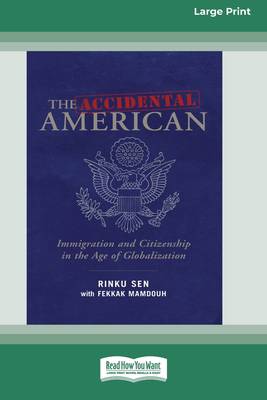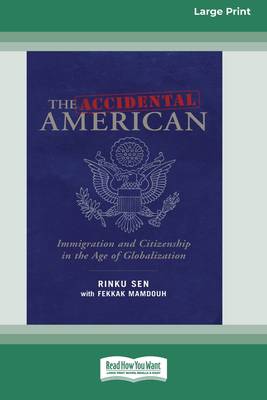
- Afhalen na 1 uur in een winkel met voorraad
- Gratis thuislevering in België vanaf € 30
- Ruim aanbod met 7 miljoen producten
- Afhalen na 1 uur in een winkel met voorraad
- Gratis thuislevering in België vanaf € 30
- Ruim aanbod met 7 miljoen producten
Zoeken
The Accidental American
Immigration and Citizenship in the Age of Globalization (16pt Large Print Edition)
Rinku Sen
Paperback | Engels
€ 56,95
+ 113 punten
Uitvoering
Omschrijving
This book tells the story of modern immigration through the life of Fekkak Mamdouh, an ordinary, if somewhat fortunate, immigrant who found himself at the center of historic events. Situations like his have given rise to a contentious debate across the United States about immigration and the purpose of contemporary policy. Politicians, media pundits, populist organizations, and policy advocates have focused either on stopping unauthorized immigration or on legalizing undocumented immigrants. The current discussion prompts seemingly discrete questions. How big should the fence along the southern border be? Should undocumented immigrants be allowed to correct their status, and if so, how easily? The debate is intensely polarized, yet too narrow to lead us to real solutions. The wall-versus-amnesty framework hides the far more fundamental question: Should the United States continue to welcome immigrants in large numbers? To answer that question in a humane manner that promises the best possible outcomes for both immigrants and current residents, for both the United States and for the countries that send immigrants, we need a holistic new framework within which to plan future action.
Specificaties
Betrokkenen
- Auteur(s):
- Uitgeverij:
Inhoud
- Aantal bladzijden:
- 608
- Taal:
- Engels
Eigenschappen
- Productcode (EAN):
- 9780369370105
- Verschijningsdatum:
- 23/02/2009
- Uitvoering:
- Paperback
- Formaat:
- Trade paperback (VS)
- Afmetingen:
- 156 mm x 234 mm
- Gewicht:
- 757 g

Alleen bij Standaard Boekhandel
+ 113 punten op je klantenkaart van Standaard Boekhandel
Beoordelingen
We publiceren alleen reviews die voldoen aan de voorwaarden voor reviews. Bekijk onze voorwaarden voor reviews.











